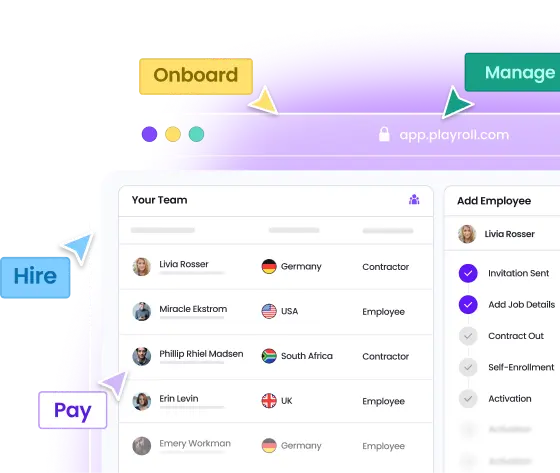What Are the Standard Working Hours In Taiwan?
An employee in Taiwan typically works a maximum of 8 hours per day and 40 hours per week. All employees, regardless of age, are subject to these standard working hours under Taiwan's Labor Standards Act (LSA). A minimum meal interval of 30 minutes must be observed by employees who work more than 4 continuous hours in a day. In typical working hours, Monday through Friday, the hours are 9:00 AM to 6:00 PM, with a one-hour lunch break.
Maximum Working Hours in Taiwan
The legal cap is 8 hours per day and 40 hours per week, usually over a five-day workweek. Employers may adjust schedules within a 2-week or 8-week framework, but weekly hours must not exceed 48, and daily hours must stay within 8. Employees can work up to 12 hours a day (regular + overtime), with a monthly overtime cap of 46 hours and a 3-month limit of 138 hours.
Industry Specific Exceptions
Certain industries in Taiwan operate under unique rules. Healthcare staff, transport workers (like bus and taxi drivers), maritime professionals, and emergency service employees often work shifts that deviate from the standard schedule. While shift structures differ, maximum hours still generally adhere to the law's limits.
Managerial and Exempt Employees
Managerial employees, defined as those with supervisory duties and decision-making authority, are not exempt from standard working hours. Though they often have flexibility in scheduling, they remain entitled to overtime pay, subject to individual contracts and employer policies.
Statutory Full-Time Working Hours in Taiwan
Full-time employment in Taiwan is legally defined as 40 hours per week, usually spread over five days. While companies may implement flexible or compressed schedules, the 40-hour threshold holds across most sectors. Part-time workers clock fewer hours and receive proportional benefits.
Overtime Regulations in Taiwan
Taiwan strictly regulates overtime to prevent worker exploitation. Overtime includes any work beyond the standard 8 hours/day or 40 hours/week, whether during regular days, flexible rest days, or public holidays. Employers must record and compensate all overtime accurately.
What Counts As Overtime in Taiwan?
Overtime includes any work exceeding 8 hours per day or 40 per week. It also covers hours worked on flexible or fixed rest days and national holidays. Overtime must be documented and compensated based on precise time worked.
Maximum Overtime In Taiwan
The monthly overtime cap is 46 hours, with a maximum of 138 hours in any three-month period. The daily maximum (including overtime) is 12 hours. Violations incur fines from NT$20,000 to NT$1,000,000, with increasing penalties for repeat offenses. Medical centers and regional hospitals face stricter penalties starting at NT$50,000. Authorities regularly inspect employers and allow workers to report violations.
Overtime Payout Rates In Taiwan
Rest Periods and Breaks In Taiwan
Employees are entitled to at least 11 consecutive hours of rest between shifts, reducible to 8 hours under specific agreements. For every 4 hours of continuous work, workers must get a 30-minute break. Employers must maintain time records for five years and ensure compliance with rest and meal break laws.
Night Shifts and Weekend Regulations
Night shifts in Taiwan are defined as work from 10 PM to 6 AM. Though no specific legal premium applies, many employers offer night shift allowances (10–20% of regular hourly pay). Weekend work on Flexible Rest Days pays up to 2.66x, while Fixed Rest Day and holiday work must be compensated at 2.66x regular wages.
Disclaimer
THIS CONTENT IS FOR INFORMATIONAL PURPOSES ONLY AND DOES NOT CONSTITUTE LEGAL OR TAX ADVICE. You should always consult with and rely on your own legal and/or tax advisor(s). Playroll does not provide legal or tax advice. The information is general and not tailored to a specific company or workforce and does not reflect Playroll’s product delivery in any given jurisdiction. Playroll makes no representations or warranties concerning the accuracy, completeness, or timeliness of this information and shall have no liability arising out of or in connection with it, including any loss caused by use of, or reliance on, the information.
.svg)
.svg)
.svg)





.svg)



.png)












.webp)









.svg)